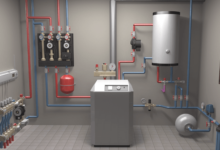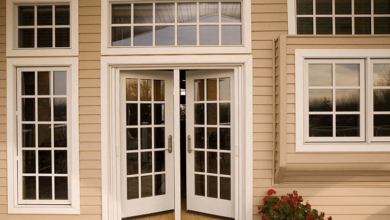10 Ways to Make Your Home More Eco-Friendly

As more homeowners in Asheville, NC, consider sustainable living, it’s vital to explore how making your home more eco-friendly can be beneficial. Eco-friendly homes in Asheville not only contribute to the city’s green ethos but also enhance property values. As the market increasingly values sustainability, properties with green upgrades tend to attract more buyers and command higher prices. Beyond the financial benefits, transforming your home into an eco-friendly haven reduces your environmental impact, lowers energy costs, and creates a healthier living space.
This guide offers straightforward steps to help Asheville residents make impactful changes toward sustainability.
1. Upgrade to Energy-Efficient Appliances
One of the simplest ways to reduce your home’s energy consumption is to upgrade to energy-efficient appliances. Products like refrigerators, washers, and dryers that meet the energy efficiency guidelines set by the U.S. Environmental Protection Agency. By opting for these appliances, homeowners can cut their utility bills significantly. For instance, an ENERGY STAR refrigerator uses at least 15% less energy than non-certified models, which translates to savings on your electricity bills and a reduction in your home’s carbon footprint.
2. Replace Windows
Old, leaky windows are a major contributor to energy loss in homes. They can lead to higher heating and cooling costs as your HVAC system works harder to compensate for air leaks. By replacing old windows with energy-efficient ones, such as those with double glazing or proper sealing, you can keep your home’s temperature more stable. Hire a local Asheville window replacement company to install energy-efficient windows and reduce the workload on your heating and cooling systems. This upgrade will improve comfort and boost your home’s overall energy performance, making it a smart investment for you.
3. Install Solar Panels
Solar power is a fantastic way to harness the region’s ample sunlight. Installing solar panels can significantly decrease electricity bills and reduce reliance on the grid. The initial cost of solar installation might seem high, but the long-term savings are substantial. Additionally, solar panel installations often qualify for tax credits, making them more affordable. Homeowners can enjoy the benefits of clean, renewable energy and potentially increase their home’s resale value by demonstrating a commitment to sustainability.
4. Use Low-Flow Water Fixtures
Water conservation is another crucial aspect of eco-friendly living. Installing low-flow water fixtures, such as showerheads, toilets, and faucets, can dramatically reduce water usage without sacrificing performance. For example, low-flow showerheads can save up to 2,300 gallons per year per household by limiting water flow to less than 2.5 gallons per minute. This simple switch not only conserves water but also reduces your water bill and the energy used to heat the water.
5. Add Insulation
Proper insulation is key to maintaining energy efficiency in a home. It helps keep the desired temperature in your house all year round, reducing the need for heating in winter and cooling in summer. There are various insulation materials available, including fiberglass, cellulose, and spray foam. Each type has its benefits and can be suited for different parts of your home, such as the attic, walls, and floors. By upgrading your insulation, you can enhance your home’s comfort and drastically cut down on your energy bills.
6. Plant a Garden
Incorporating a garden into your Asheville home is not just about aesthetics; it’s about creating a sustainable ecosystem. Gardens help cool your property naturally, reducing reliance on air conditioning during warm months. They also improve air quality and support local wildlife, including pollinators crucial for maintaining biodiversity. Start with native plants, which are more likely to thrive and require less water and care than non-native species. Whether it’s a vegetable garden that cuts down on your grocery bills or a flower garden that enhances your home’s curb appeal, gardening is a rewarding way to contribute to your home’s eco-friendliness.
7. Choose Sustainable Flooring
When it’s time to renovate or update your flooring, consider sustainable options. Bamboo and recycled wood are excellent choices as they are both durable and environmentally friendly. Bamboo grows quickly, making it a highly renewable resource, while recycled wood repurposes existing materials, preventing landfill waste. These flooring materials not only add a modern touch and warmth to your home but also minimize your environmental footprint. Sustainable flooring is a powerful step towards an eco-friendly home, blending functionality with environmental responsibility.
8. Use Smart Home Technology
Smart home technology optimizes your home’s energy use, making it easier to live sustainably without sacrificing comfort. Smart thermostats, for instance, adjust the temperature based on your daily schedule and weather conditions, significantly reducing unnecessary heating and cooling. Similarly, smart lighting systems can be programmed to turn off when no one is in the room, saving electricity. These technologies not only offer convenience but also empower you to control and monitor your home’s energy consumption, leading to considerable savings on utility bills.
9. Implement Water Harvesting Techniques
Water harvesting involves collecting and storing rainwater for later use, which is particularly useful in Asheville’s variable climate. Installing a rain barrel is a simple way to start; it captures runoff from your roof that can be used for watering your garden or washing your car. This not only reduces your water bill but also lessens the strain on the municipal water system and helps prevent stormwater runoff from polluting local waterways. Embracing water harvesting is a proactive step towards sustainable living, demonstrating how traditional techniques can be integrated into modern homes.
10. Opt for Natural Cleaning Products
Switching to natural cleaning products eliminates the need for harsh chemicals that can harm the environment and your health. Many cleaning agents contain volatile organic compounds (VOCs) that contribute to indoor air pollution and are hazardous to inhale. You can easily make your own cleaning solutions using ingredients like vinegar, baking soda, and lemon, which are effective, affordable, and eco-friendly. By choosing natural cleaning products, you protect your family’s health, the quality of indoor air, and reduce the introduction of toxic elements into the environment.
Conclusion
Asheville homeowners have a unique opportunity to lead by example in the movement towards sustainability. Each step you take towards making your home more eco-friendly not only benefits the environment but also enhances your living conditions and increases your property’s value. Starting with energy-efficient appliances, updating to better insulation, or even implementing a smart home system are all impactful ways to contribute to a healthier planet and community.
Embrace these changes with enthusiasm and consider them an investment in your future and the well-being of Asheville. The city’s supportive community and abundant local resources make it easier than ever to transition to a sustainable lifestyle. By adopting these ten straightforward strategies, you can significantly reduce your ecological footprint, save money, and live in harmony with your surroundings. Let’s make Asheville a shining example of sustainable living, one home at a time.







